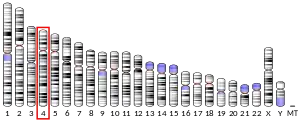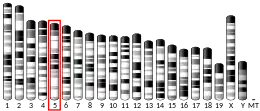Cytokine-like protein 1
Cytokine-like protein 1 (also protein C17) is a protein that in humans is encoded by the CYTL1 gene.[5]
| CYTL1 | |||||||||||||||||||||||||||||||||||||||||||||||||||
|---|---|---|---|---|---|---|---|---|---|---|---|---|---|---|---|---|---|---|---|---|---|---|---|---|---|---|---|---|---|---|---|---|---|---|---|---|---|---|---|---|---|---|---|---|---|---|---|---|---|---|---|
| Identifiers | |||||||||||||||||||||||||||||||||||||||||||||||||||
| Aliases | CYTL1, C17, C4orf4, cytokine like 1 | ||||||||||||||||||||||||||||||||||||||||||||||||||
| External IDs | OMIM: 607930 MGI: 2684993 HomoloGene: 10254 GeneCards: CYTL1 | ||||||||||||||||||||||||||||||||||||||||||||||||||
| |||||||||||||||||||||||||||||||||||||||||||||||||||
| |||||||||||||||||||||||||||||||||||||||||||||||||||
| |||||||||||||||||||||||||||||||||||||||||||||||||||
| |||||||||||||||||||||||||||||||||||||||||||||||||||
| |||||||||||||||||||||||||||||||||||||||||||||||||||
| Wikidata | |||||||||||||||||||||||||||||||||||||||||||||||||||
| |||||||||||||||||||||||||||||||||||||||||||||||||||
Function
Protein C17 is a cytokine-like protein specifically expressed in bone marrow and cord blood mononuclear cells that bear the CD34 surface marker.[6] Functionally, C17 was identified as a secretory protein expressed in CD34+ haemopoietic cells.[6] CYTL1 seems to regulate chondrogenesis and is required for the maintenance of cartilage homeostasis and might, additionally, work as a regulatory factor in embryo implantation in the stage of early pregnancy.[7]
This family of proteins, C17, is found in vertebrates. Proteins have two conserved sequence motifs: PPTCYSR and DDC.
References
- GRCh38: Ensembl release 89: ENSG00000170891 - Ensembl, May 2017
- GRCm38: Ensembl release 89: ENSMUSG00000062329 - Ensembl, May 2017
- "Human PubMed Reference:". National Center for Biotechnology Information, U.S. National Library of Medicine.
- "Mouse PubMed Reference:". National Center for Biotechnology Information, U.S. National Library of Medicine.
- "Entrez Gene: Cytokine-like 1".
- Liu X, Rapp N, Deans R, Cheng L (May 2000). "Molecular cloning and chromosomal mapping of a candidate cytokine gene selectively expressed in human CD34+ cells". Genomics. 65 (3): 283–92. doi:10.1006/geno.2000.6170. PMID 10857752.
- Ai Z, Jing W, Fang L (2016). "Cytokine-Like Protein 1(Cytl1): A Potential Molecular Mediator in Embryo Implantation". PLOS ONE. 11 (1): e0147424. Bibcode:2016PLoSO..1147424A. doi:10.1371/journal.pone.0147424. PMC 4723121. PMID 26800213.
Further reading
- Deng X, Zhao HS, Peng Z, Deng WW, Li N, Guo S, Shi TP (April 2011). "[Study on the mechanism of C17orf62 induced cell death]". Beijing da Xue Xue Bao. Yi Xue Ban = Journal of Peking University. Health Sciences. 43 (2): 168–72. PMID 21503106.
- Tomczak A, Pisabarro MT (April 2011). "Identification of CCR2-binding features in Cytl1 by a CCL2-like chemokine model". Proteins. 79 (4): 1277–92. doi:10.1002/prot.22963. PMID 21322034. S2CID 24312749.
- Chao C, Joyce-Shaikh B, Grein J, Moshrefi M, Raoufi F, Laface DM, McClanahan TK, Bourne PA, Pierce RH, Gorman DM, Pflanz S (2011). "C17 prevents inflammatory arthritis and associated joint destruction in mice". PLOS ONE. 6 (7): e22256. Bibcode:2011PLoSO...622256C. doi:10.1371/journal.pone.0022256. PMC 3143151. PMID 21799806.
- Chen XD, Xiong DH, Yang TL, Pei YF, Guo YF, Li J, Yang F, Pan F, Tan LJ, Yan H, Liu XG, Lei SF, Li X, Ning LL, Zhu XZ, Levy S, Kranzler HR, Farrer LA, Gelernter J, Recker RR, Deng HW (March 2012). "ANKRD7 and CYTL1 are novel risk genes for alcohol drinking behavior". Chinese Medical Journal. 125 (6): 1127–34. PMC 4174677. PMID 22613542.
- Kwon YJ, Lee SJ, Koh JS, Kim SH, Lee HW, Kang MC, Bae JB, Kim YJ, Park JH (January 2012). "Genome-wide analysis of DNA methylation and the gene expression change in lung cancer". Journal of Thoracic Oncology. 7 (1): 20–33. doi:10.1097/JTO.0b013e3182307f62. PMID 22011669.
This article incorporates text from the United States National Library of Medicine, which is in the public domain.



